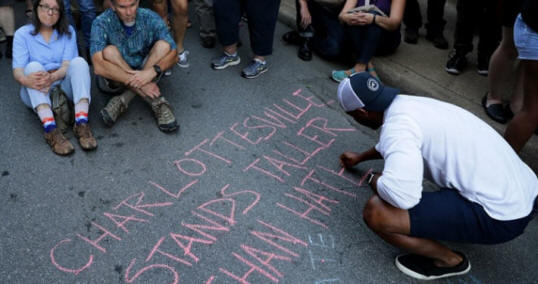
The Great Smoky Mountain Journal
Staff Reports
Posted: Sunday, January 21, 2018 11:23 AM
FAITH OPED: What Was On Display In Charlottesville Was Not A Display of Heaven's Desire For Nation
What we saw this past weekend in Charlottesville was the exact, fiendish opposite. Crowds filled with hate, bent on violence. We saw not dazzling robes of white washed in the blood of the lamb, but the stains of red from human blood spilled in demonic anger.
I learned of what happened Saturday afternoon after landing in the Dominican Republic, where I’ll be teaching this week. Yesterday on BreakPoint, we promised part two of our series on the American suicide epidemic, and we will pick that up tomorrow. But today, facing the specter of racism in our country, it’s time for moral clarity.
And here it is: As my BreakPoint co-host Eric Metaxas tweeted over the weekend, racism is the very antithesis of the love of Jesus for all. I’ll expand on that thought: every racist ideology, including the white nationalism and neo-Nazi rhetoric and images displayed by the so-called alt-right in Charlottesville, is rooted in the pit of hell. There’s no defending it. It’s not Christian. It’s not American. And it ought not even be associated with conservatism.
And as My BreakPoint this Week co-host Ed Stetzer wrote at Christianity Today, it’s easy to say that there are “many sides” involved in violence and hatred. In fact, we Christians do well to call out the left-wing extremists like Antifa, who parade through downtowns smashing things. But Christ followers must also condemn this act, this protest, this violence in the strongest possible terms, and I’m grateful for those political and religious leaders who claim the name of Christ who wasted no time in doing so. The world needs to hear that clear Christian witness.
And still, these events make it painfully obvious that, while we need deft and courageous political leadership, it’s the Church that’s most needed now. Politics will not save us from ourselves. As one evangelical adviser to President Trump, Johnnie Moore, told CNN, “The right remains too passive and the left remains too political when it comes to ethnic divisions in this country. One side underestimates the issue and the other side provokes further conflict. Both sides distrust each other. This must end if we are to find national healing.”
I’m glad President Trump finally identified the alt-right by name, but his delay, especially in light of his long history of Twitter specificity, is an example of the passivity Moore described. As Senator Orrin Hatch tweeted, “We should call evil by its name. My brother didn’t die fighting Hitler for Nazis to go unchallenged today.”
Look, America has a race problem. Political parties, special-interest groups, and the media aren’t helping. In fact, too often, they make things worse.
Ours is a culture that loudly pays lip service to ideas like “human dignity,” “value,” and “human rights,” but renders them meaningless by tethering them to made-up identity politics or disgruntled, angry appeals to “heritage.”
Only the biblical vision of the image of God can ground universal dignity, value, and establish human rights. Understanding the biblical concept of the fall keeps us from finding the enemy only in the other, as if the problem is always outside of ourselves. No, as Aleksandr Solzhenitsyn wrote, “the line dividing good and evil cuts through the heart of every human being.”
And only the restoration Christ brings offers any way forward past the hate, the hurt, and the history still threatening to tear our nation apart. Only the Church has that message—to proclaim and embody—in the midst of the brokenness all around us.

